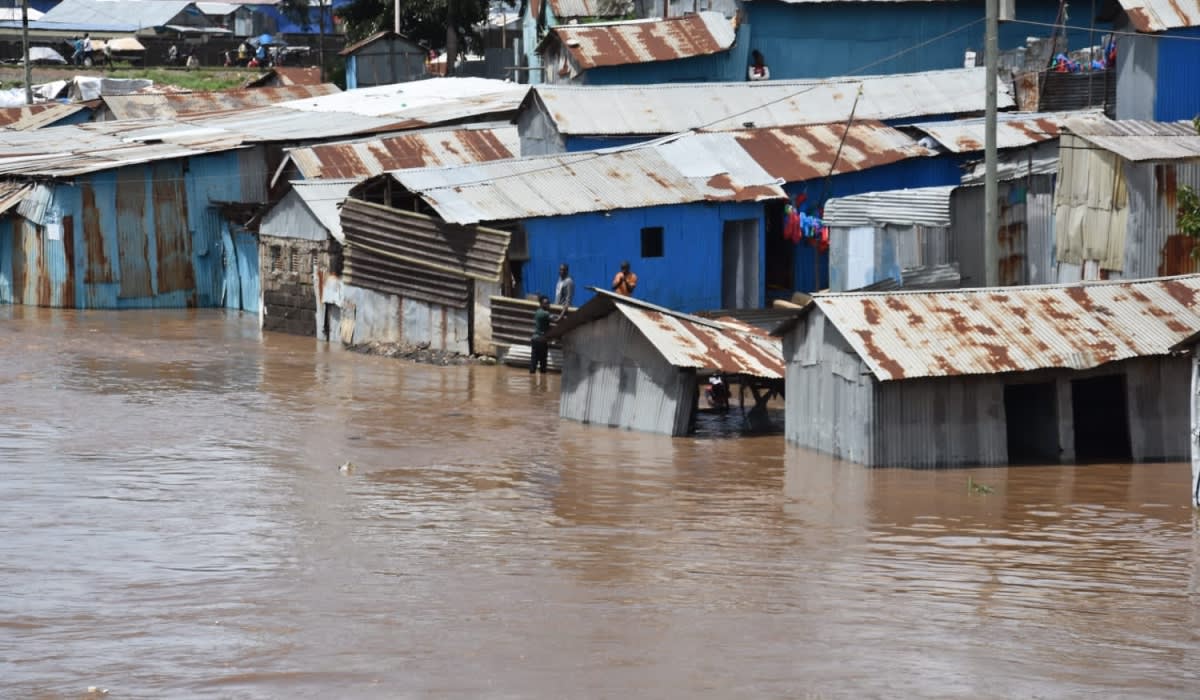Rising Above the Floods: Stories of Strength from Mukuru and Mathare
The Resilience of Nairobi’s Informal Settlements Amidst Crisis
by Christian Sonntag, Emmanuel Atamba, Serah Kiragu-Wissler, William Onura | 2024-05-24

National situation
What started as normal rains in many parts of Kenya on the night of April 20th proved different. The heavy rains largely attributed to climate change compounded by cyclical El Niño phenomena went on to cause floods never seen before in the last few years. More than 12 counties were affected by the floods that continued from April 20th through to May 13th, when the intensities reduced.
I have never seen any flooding like this since the 1997 El Niño rains. We have had flooding in some parts of Mukuru during enhanced rains in the recent past, but what we have seen this year, I haven't seen in a long time.
- Patrick Njoroge, Akiba Mashinani Trust

Mukuru residents navigating flood waters. ©Shakur Njeru, Viwandani Comprehensive Community Organization VICCO
The floods left a trail of destruction in the country, with over 267 losing their lives as a result. An additional 188 people have been seriously injured and 75 others are still unaccounted for. At least 281,835 people (ca. 56,367 families) have been displaced, while 380,573 (ca. 76,114 families) have been affected by persistent heavy rains and flooding as of 9th May, according to the National Disaster Operations Centre (NDOC). More than 10,000 heads of livestock have been lost, 41,562 acres of cropland and 61 roads damaged, 886 businesses, 1,967 schools, 1,465 water sources and 62 health facilities damaged in 11 out of 42 counties affected by floods as of May 9th, according to authorities and the Kenya Red Cross Society.
Impact on our project sites
TMG's Urban Food Futures programme is implemented in two informal settlements in Nairobi, namely Mukuru and Mathare, which have been highly impacted by the recent floods. In Mukuru, the programme is being implemented through three pathways: ‘Coping with crisis’, ‘Trading to eat’ and ‘Controlled environment agriculture'. The activities implemented in the three pathways in collaboration with local partners include developing and piloting a school feeding model for complementary schools, research and capacity building for informal food vendors and a controlled environment agriculture system pilot. In Mathare, TMG is working on the connection between food security and gender-based violence and the role of women-run community eateries.
Nairobi County was the worst-affected county in the recent floods, with an estimated 147,061 people affected and 20,968 families displaced by the heavy rainfall. In Mukuru and Mathare alone, at least 20,000 families were displaced by the floods and demolitions along the riparian reserve that followed. Several roads in Mukuru and Mathare were rendered impassable by the floods, disrupting the food supply chain as food suppliers and vendors could not get their products, including food to the markets. Furthermore, the floods prevented some of the residents from accessing eateries, causing them to go hungry for some days.
The impacts of the floods have also been reflected in price changes and availability of necessary commodities such as food. In the wake of the floods, food prices have surged due to disruption in existing food distribution channels. Some essential food items have become scarce, as pointed out by one of our community champions.
Essential food items like onions, tomatoes, vegetables, and fruits have become scarce since most food suppliers are not able to operate. Food stocks in some eateries have been destroyed. Several kitchen gardens were also destroyed.
- Ann M. Wanjiru, Programmes Coordinator, Mathare Legal Aid and Human Rights Advocacy (MLAHRA)
Disaster response
In supporting affected families, state and non-state actors provided temporary camps and relief through food and non-food stuff. Over 40 Community-based organizations, led the collection and distribution of foodstuffs to families affected by the floods. Both national and county governments also swung into action to aid those affected, even as it was observed that the response was rather slow. Nairobi county, for instance, redirected its school feeding infrastructure, given that schools were closed, to prepare and distribute food to families affected. This response made use of available systems and was, therefore, quicker to deploy.
A strong show of resilience and solidarity
The invisible heroes are the communities in the affected areas, both in Mukuru, Mathare as well as other affected areas. Communities in the affected areas have shown strong resilience with local initiatives to support those impacted by the floods as well as lead in measures to avert further impacts. Some community-led interventions include hosting affected families, sharing basic needs such as food, clothes with those affected, and providing and enforcing safety advisories during the floods. Local organizations such as VICCO, Akiba Mashinani Trust and others have also worked tirelessly to organize communities in response to the flood situation and engage relevant stakeholders, including the government, in meeting the needs of communities. Schools and churches have opened their doors to flood victims as alternative shelters.
Self-help groups of food vendors such as ‘Safina Mukuru Fresh’ and ‘Reuben Fresh Vendors’ have worked on collectively helping members affected by the floods to re-establish their structures and businesses affected by the floods. The association works through its internal lending structures to provide loans to traders affected by the floods. The food vendors CBOs have also extended their member loan repayment periods to cushion members affected by the floods and allow them more time to recover.
Conclusion
While the rains have significantly reduced, ending the flooding situation in most parts of the country, the impact of the floods on those directly affected will not go away that quickly. Where we work, in Mukuru and Mathare, we note that the floods have hit some of the most vulnerable households affected by other crises. In this context, we aim to continuously highlight the need to address some of the systemic issues affecting communities in urban informal settings and build their capacities and resilience to not only survive but thrive. TMG stands in solidarity with the Kenyan people even as they walk through the journey of recovery from the recent events.

In Memory of Klaus Töpfer
Jes Weigelt reflects on the passing of Klaus Töpfer, the questions motivating his commitments, and the roots of TMG Research’s founding.

Investing in community level land and environment governance institutions is imperative to the success of national forest and landscape restoration plans: TMG case study of Bua catchment in Malawi
A case study of forest protection and conservation measures implemented Bua catchment area in Malawi, and the tenure rights dynamics for local communities living adjacent to forestlands.

Exploring pathways for governing food systems transformation (FST) in Kenya
TMG Research organized a workshop in Nairobi with diverse actors from government, civil society, private sector, and research to jointly explore governance mechanisms for the transformation of Kenya’s food systems.
